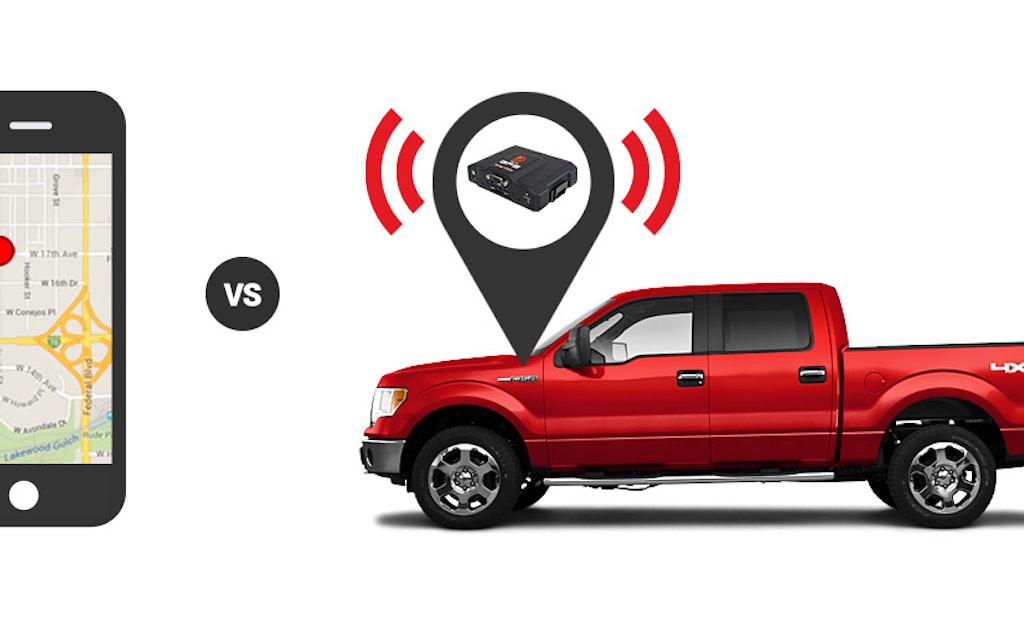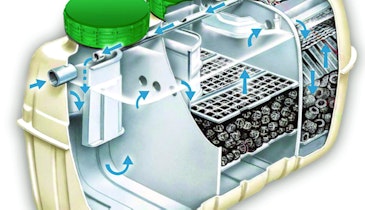Interested in Vans, Trucks & Fleet?
Get Vans, Trucks & Fleet articles, news and videos right in your inbox! Sign up now.
Vans, Trucks & Fleet + Get AlertsThere is a common misconception that vehicle-installed and cellphone GPS tracking systems are practically the same technology, but they are actually very different.
To decide which type of system will provide the information you need, think about what you are trying to accomplish with GPS tracking. Are you looking to track the movements of employees from job site to job site, or just have mobile time cards with location information? If so, then cellphone GPS tracking might be the right way to go. However, if you are looking to monitor productivity, reduce fuel usage, optimize miles driven, improve maintenance scheduling and increase safety, a vehicle-installed GPS tracking system is likely the right choice for your business.
“Can’t we just do that with a cellphone?”
According to a recent report released by Bobit Business Media on the adoption of GPS tracking and usage within the light- and medium-duty fleet market, almost 30 percent of commercial fleets surveyed stated that they have not implemented GPS tracking due to budgetary constraints. If budget is the reason you haven’t implemented a system into your operations, you may be looking into cellphone-based GPS tracking systems in hopes to receive the same type of fleet intelligence at a lower cost.
If you are looking for a less expensive GPS tracking option and are not aware of the key differentiators between these two technologies you might be thinking, “Can’t we basically get the same information at a lower cost from a cellphone GPS tracking system?” Boldly stated, you will not receive the same level of information with this type of platform because you are tracking a cellphone, not the vehicle itself. It is strongly advised that you do not choose any type of technology based on price if it doesn’t supply the information you need.
One of the top reasons that fleets are adopting GPS tracking is because of the return on investment. If you select a GPS tracking system that does not provide the information you need to achieve maximum ROI, you will be missing out on the most significant benefit that makes tracking worthwhile.
The Disadvantages of Cellphone GPS Tracking Systems
There are many differences in capability between the technologies that will result in substantial disadvantages, even some you might not suspect.
Less driver accountability If drivers decide that they don’t want to be tracked at any given time, they can easily turn off their cellphone or simply turn off the GPS function. Cellphone GPS tracking systems give drivers the ability to choose where and when they are willing to be monitored, which is really too much power in your employees’ hands when they are on your time. It will also greatly increase the chance of unauthorized usage of company vehicles and reckless driving behavior.
“Can you hear me now?” It’s far too easy for cellphones to suffer signal loss or have a battery die. There are minimal battery concerns with a vehicle-installed device because it is wired into the vehicle’s battery as a constant source of power. Even if GPS tracking devices are in areas with no cellular coverage, they have the ability to “store forward” so information is never lost. When the vehicle goes out of your cellular provider’s coverage area, the device continues to collect location data from the satellites even though the vehicle cannot be seen live on a map. As soon as the vehicle enters back into an area with cellular coverage, all information is pushed to the GPS tracking platform’s servers for seamless reporting. Selecting a less reliable form of GPS tracking technology will eventually backfire, and praying it doesn’t happen in an emergency situation is not a sound strategy.
Your competitors will leave you in the dust Fleets become more efficient by eliminating the traditional paperwork associated with fleet management, increasing route efficiency, evaluating time spent on the job site, streamlining maintenance management and more. Vehicle-installed GPS tracking platforms allow fleets to provide customers accurate ETAs, service more customers per day and respond more quickly to emergencies. If your business gains the reputation for not being as efficient as your competition, especially in time-sensitive situations, you will end up losing business.
No visibility into costly challenges Another major disadvantage to using cellphone GPS tracking is that you will have no way to establish or measure your costly challenges that are critical to the success of your fleet tracking initiative. Receiving actionable information about fuel and labor costs, maintenance, fleet utilization, etc., is the only way to make improvements to your fleet operations. Without this vital information about substantial business opportunities, you have no way to know if you are spending more than you should be or if processes need to be restructured.
There’s an app for that If you are still leaning towards cellphone GPS tracking because it seems like the more convenient option, consider the following: Many vehicle-installed GPS tracking systems have mobile apps for their software, so you will still be able to track your mobile workforce from your cellphone. You will be tracking the vehicle and not the employee’s cellphone, so you have the ability to receive even more information with the same level of convenience.
Receive Fleet Intelligence with Vehicle-Installed GPS Tracking
As we all know, cellphones are our main tool for communication these days and have great GPS for directions and current location, but they are not developed for high-quality fleet management. Using a vehicle-installed GPS tracking system is much more than just location updates; it’s true fleet intelligence.
Reduce costs According to a recent Bobit Business Media research study, the No. 1 fleet cost for most businesses is fuel. One of the most significant savings fleets experience with a vehicle-installed GPS tracking system is a reduction in fuel expenses. This is achieved by monitoring fuel usage and taking action to make sure vehicles are not excessively idling, speeding or being driven more than allowed or necessary. Cellphone-based systems do not have the ability to track or report on any fuel information about your vehicles, so it is essentially impossible to receive the same type of savings.
Reduce risk Improving safety takes GPS tracking software from “nice to have” technology to an essential resource for your fleet operations. You will be able to advance your safety procedures, respond faster in the event of an emergency, monitor driver behavior, and ensure vehicles and equipment are safe to operate, which will profoundly reduce risk for both your drivers and the public. Cellphone GPS tracking platforms will not allow you to improve safety in any of these aspects, or provide any other significant safety benefits.
Increase revenue One of the most effective ways to increase revenue with a vehicle-installed GPS tracking platform is by completing more jobs because your team is more productive with their time. Vehicle-installed GPS tracking technology will increase dispatch and route efficiency so your drivers are able to arrive at the job site sooner. This type of system can also be used to ensure employees are being as productive as possible once they are at the job. Stay on top of time spent on the job site and track late arrivals to keep drivers on schedule throughout the day. By maximizing the workday, your fleet will be able to complete more jobs and increase revenue.
.png) Vehicle-installed GPS tracking is how businesses gain the ability to make real changes to their operations. Selecting a vehicle-installed GPS tracking platform will provide much more significant benefits for your business in the long run than if you chose a cheaper, cellphone-based system. No matter how small or large your fleet might be, there is much greater value in using GPS tracking software that will allow your business to become more productive, efficient and lucrative overall.
Vehicle-installed GPS tracking is how businesses gain the ability to make real changes to their operations. Selecting a vehicle-installed GPS tracking platform will provide much more significant benefits for your business in the long run than if you chose a cheaper, cellphone-based system. No matter how small or large your fleet might be, there is much greater value in using GPS tracking software that will allow your business to become more productive, efficient and lucrative overall.
To learn more about how to implementing a vehicle-installed GPS tracking system will improve your fleet operations, contact GPS Insight at www.gpsinsight.com or 866/477-4321.






